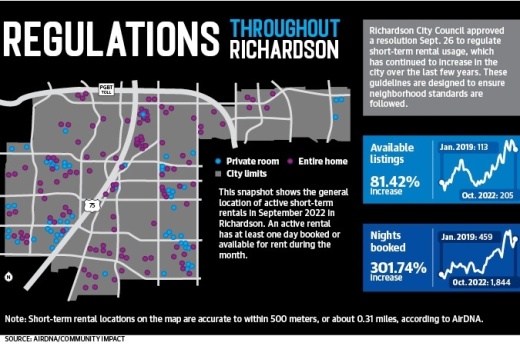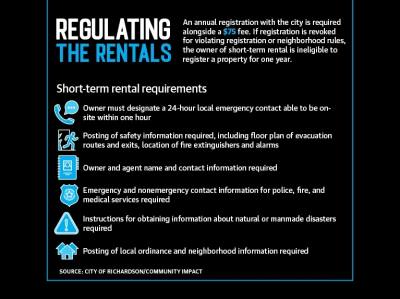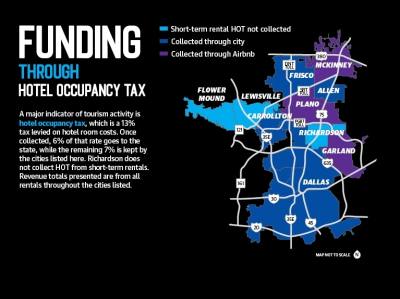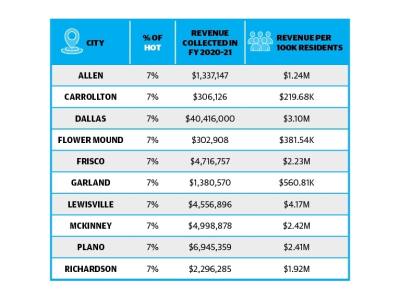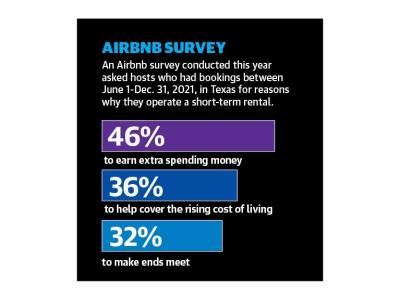Short-term rentals are defined by city officials as residential properties that are rented for no longer than 30 consecutive days and apply to single-family dwelling or multiunit buildings, including apartments. Local residents often rent out houses through a short-term rental company, such as Airbnb and Vrbo.
Regulations approved by City Council in September include mandatory registration, providing contact information for guests and giving the city a method for fining those who violate these rules.
Richardson City Manager Don Magner said the rules were designed to be easy for compliance for those renting out their homes.
“I think it’s important to make sure that we establish the best rules for Richardson,” Magner said.
Airbnb officials said the company supports cities implementing regulations on short-term rentals, hoping to build trust between its users and local governments.
“We appreciate the city of Richardson’s thoughtful approach to regulations, which strike a balance between protecting the benefits short-term rentals provide to residents and the local economy, and addressing community concerns,” Airbnb Public Policy Manager Luis Briones said.
The need for regulation
According to Hunter Webb, real estate agent at Keller Williams Central 75 in Richardson, short-term rentals became popular around 10 years ago as an alternative to hotel rooms. Short-term rentals have since become huge industry drivers, with Wall Street companies buying local properties to fill demand from visitors.
“Local governments are starting to realize that we’ve got to put some sort of regulation around it to make sure it doesn’t go out of control,” Webb said.
Heading into 2022, Magner said council made it a priority to address short-term rental regulations.
“We had heard from the community over the course of a couple of years about homes that were operating in a poor way,” Magner said.
He said the city is not allowed to prohibit or ban short-term rentals and may not limit short-term rentals to owner-occupied residential properties, per Texas Supreme Court regulations.
Richardson based its regulations on nearby city rules, which passed similar registration requirements and nuisance ordinances, he said.
“We wanted to make sure that we adopted regulations that were responsive to the kinds of issues we were seeing in the city, but that were also legally defensible,” Magner said.
Approved guidelines
The registration program is expected to be in effect starting Jan. 1. Registration with the city, including an annual application fee of $75, is required, with those in violation of registration able to be given a fine of up to $2,000 by the city.
According to the registration guidelines, a local responsible party will be designated to be on-site within one hour, if requested, to address property issues.
In addition, rental guests will be notified of contact information for the local responsible party. This information includes the name of a 24-hour contact and a depiction of the floor plan.
“I commend the council for instituting common sense registration requirements for short-term rentals, and in particular the provision that a local 24-hour representative of the owner must be available,” said Warren Caldwell, president of the Canyon Creek Homeowners Association.
City restrictions regarding noise, parking and trash were also set for all short-term rental properties.
“While you’re here in the community, it’s important to do the simple things that the vast majority of our residents do to make Richardson a really nice place to live,” Magner said.
A registration revocation and appeals process was also established in the ordinance.
“We feel like we’ve been empowered with the kinds of information and enforcement actions that we need to be effective,” Magner said.
One measure addressed in nearby cities but not by Richardson is the collection of hotel occupancy tax.
“The city does not collect occupancy taxes from short-term rental properties and will continue to evaluate the benefit of collecting them as the registration program is implemented,” Communications Director Greg Sowell said.
Demand in rental market
Texas cities have seen huge growth in rental housing supply over the past few months as a whole, according to data collected by AirDNA in a monthly market review.
In Richardson, there were 205 available rentals in October 2022, an increase of 35% compared to October 2019, according to AirDNA data. Over the same period, booked nights—a measure of demand—nearly tripled to 1,844 nights, according to AirDNA.
Most of these short-term rental units operate around the times of events at the Eisemann Center and The University of Texas at Dallas, according to Magner.
Webb said the demand for short-term rentals have created a need for available single-family homes, which are at a premium in Richardson.
“Rental prices are an extremely volatile market,” Webb said. “There still aren’t a ton of homes available, especially on the long-term side of rental.”
According to a survey of Texas Airbnb hosts booked between June 1-Dec. 31, 2021, short-term rental hosts list financial support as a top deciding factor.
“The overwhelming majority of hosts on Airbnb are responsible neighbors who rely on home sharing to supplement their income amid the rising cost of living and to welcome guests who support local small businesses,” Briones said.
Since instituting a temporary party ban companywide, Airbnb officials said it has had a 46% year-over-year drop in party reports. As a result, Airbnb made the ban permanent in June 2022.
Going forward
Magner said the city is working to get the website and the online registration up on Dec. 1 to allow short-term rentals to begin registering through the holidays. Those who are not registered by the end of January would be in violation of the ordinance.
The city plans to monitor the effectiveness of the program and report back to council after about a year, Magner said.
“If somebody is experiencing an issue with a short-term rental, please report it,” Magner said. “Because if it’s not reported when it’s happening, then we can’t address it.”




